Faculty of Health Care Department of Clinical Laboratory Science To Become a Specialist in Clinical Laboratory Testing
English translation in progress. Thank you for waiting.
Contents
Department Overview
This Department is suitable for the following people:
- Those who aspire to become clinical laboratory technicians
- Those who enjoy working with microscopes
- Those who want to make use of their expertise and play an active role in the field
Learning Key Points
01. Become a clinical laboratory technician, a field in increasing demand
Clinical laboratory technicians are healthcare professionals who conduct tests on patients’ blood, urine, and other specimens, as well as assessments of physiological functions. In recent years, this profession has gained increasing attention for its role in conducting PCR and other diagnostic tests essential for disease detection and treatment. In our Department, students acquire expertise in both specimen testing and physiological function testing—core competencies for careers in hospitals, clinical laboratories, and research institutions. The program also provides comprehensive preparation for the National Clinical Laboratory Technician Examination.
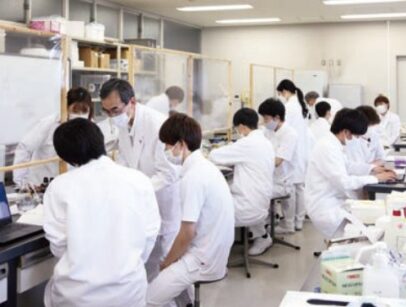
02. Learn team-based healthcare through clinical training
In the third year, students undertake 16 weeks of clinical training at Tenri Hospital, rotating through all departments. They gain experience while observing the use of state-of-the-art equipment effective in on-site examinations and medical treatment. Through this immersive training, students not only refine their technical skills but also deepen their understanding of their role within a multidisciplinary healthcare team. This training prepares them to become clinical laboratory specialists capable of making meaningful contributions through their testing expertise.
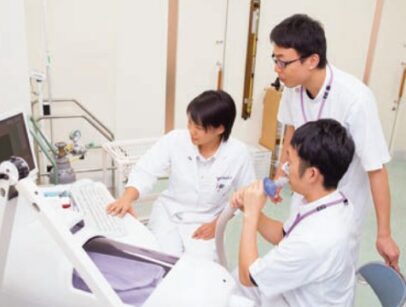
03. Building practical skills through supervised graduation research
For their graduation research, students choose a topic from among the research themes offered by faculty members or instructors affiliated with Tenri Hospital. Under one-on-one supervision, they develop both the fundamental skills of a researcher and the practical abilities needed to contribute immediately in professional settings after graduation. Many alumni go on to excel in diverse fields, including medical institutions, clinical laboratories, and companies engaged in the development and manufacturing of reagents and medical equipment.
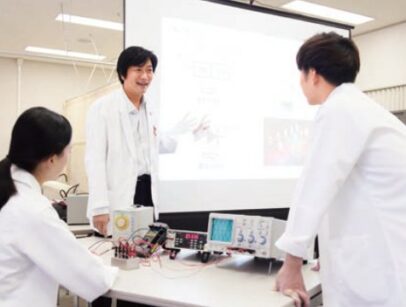
Career support to make the most of your learning for the future
Comprehensive Support for the National Clinical Laboratory Technician Examination
Students who earn the required credits in specialized subjects and meet all graduation requirements are eligible to sit for the National Clinical Laboratory Technician Examination, held each year in mid-February. After completing specialized subjects assigned to each academic year, students take mock examinations modeled on the national examination to review and consolidate their knowledge. The Department also offers support for students who wish to pursue graduate studies or obtain additional qualifications as a clinical engineer or cytotechnologist. Students can complete the necessary coursework while enrolled and then spend one year at a training school after graduation to earn these additional qualifications.
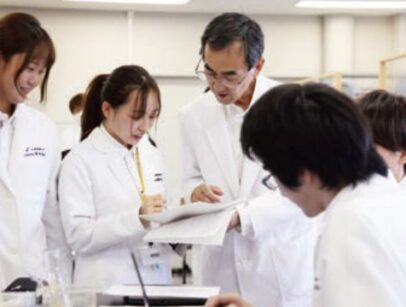
Four-year learning process
First-year
続きを読むEstablishing a strong foundation through specialized common subjects
Along with foundational academic subjects essential for university study, students gain knowledge of gene structure and function, human anatomy and physiology, disease mechanisms, laboratory techniques, and methods for testing blood and urine samples.
Representative Classes
 ・Freshman Seminar
・Freshman Seminar
In the first half of this seminar, students develop essential academic skills such as information gathering, articulating their ideas, and delivering effective presentations foundational abilities for success at the university level. In the second half, students participate in interactive learning with medical staff at Tenri Hospital, including hospital tours, lectures, and training in real clinical settings.
Second-year
続きを読むMastering fundamental knowledge, its application, and testing techniques
Students acquire a broad range of testing techniques used in clinical laboratory practice and develop practical skills through extensive training. The second year features the highest number of lectures and practicum sessions in specialized subjects related to clinical laboratory science.
Representative Classes
 ・Ultrasonography
・Ultrasonography
This subject focuses on imaging techniques, including ultrasound and MRI. Students study both the theoretical foundations and practical skills necessary to acquire physiological function data. The subject aims to equip students with the techniques required to address the diverse demands of clinical settings.
Third-year
続きを読むClinical Training at Tenri Hospital
In the second semester of their third year, students participate in a 16-week clinical training program at Tenri Hospital. Prior to beginning this training, they complete a comprehensive skills assessment called the “Hospital Practice Preparation,” designed to evaluate their proficiency and readiness for real clinical practice.
Representative Classes
 ・Hospital Practice of Clinical Laboratory Science
・Hospital Practice of Clinical Laboratory ScienceStudents participate in a rotation-based clinical practicum within the Clinical Laboratory Department at Tenri Hospital, concentrating on areas related to specialized clinical laboratory subjects. Working in pairs, they rotate through each laboratory section, spending one to two weeks per section, to gain experience and practical skills.
Fourth-year
続きを読むResearch thesis writing + preparation for the national examination
In the “Research in Clinical Laboratory Science” course, students conduct research on topics assigned by their academic advisors and write a thesis based on their findings. Concurrently, they prepare for the National Clinical Laboratory Technician Examination, with the goal of successful qualification.
Employment Results and Qualifications
92.9%
※Actual results of March 2025
Including data based on graduates of the former Tenri Health Care University
Major employers (information for the most recent 5 years)
Tenri Hospital, Kansai Medical University Hospital, Kindai University Hospital, Hamamatsu University Hospital, Kochi Medical School Hospital, Nara General Medical Center, Nara Regional Medical Organization, Nara City Hospital, Kyoto Chubu Medical Center, Kuwana City Medical Center, Japanese Red Cross Kyoto Daiichi Hospital, Kouseikai Takai Hospital, Saiseikai Chuwa Hospital, Takanohara Central Hospital, Nishinokyo Hospital, Kashiba Asahigaoka Hospital, Yao Tokushukai General Hospital, Okanami General Hospital, Kyoto Tanabe Central Hospital, LSI Medience Corporation, BML, Inc., SRL, Inc., Medic Co., Ltd., Nara City Medical Association, Sekisui Medical Co., Ltd., Environmental Sanitation Chemicals Co., Ltd., Canon Medical Diagnostics Corporation, Honest Co., Ltd. (listed in no particular order)
Main higher education destinations (information for the most recent 3 years)
Graduate School of Medicine, Kyoto University
Graduate School of Medicine, Osaka University
Graduate School of Medicine, Nara Medical University
Graduate School of Science and Technology, Nara Institute of Science and Technology
Cytotechnologist Training Course, Kio University
Clinical Engineer Training Program, Kyoto College of Health and Hygiene
Clinical Engineer Training Program, Osaka High Technology College
(listed in no particular order)
Available Qualification
- Eligibility to take the National Clinical Laboratory Technologist Examination
Faculty list
Curriculum
Curriculum tree(PDF)
Curriculum map(PDF)
Education Policy
Admission Policy
In order to fulfill the educational goals of the Department of Clinical Laboratory Science, we seek for students with the following qualities:
1. (Action) Those who aim to develop the skills and professionalism required in the field of clinical laboratory science.
2. (Knowledge) Those who aim to develop specialized knowledge and skills in clinical laboratory science and its related fields.
3. (Attitude, Action) Those who seek to cultivate communication skills essential for fostering positive interpersonal relationships.
4. (Knowledge, Skills) Those who aim to become competent members of medical teams by applying their expertise in clinical laboratory science.
5. (Attitude) Those who are motivated to cultivate a proactive attitude toward continuously tackling challenges in order to contribute to the advancement of new testing technologies.
6. (Action) Those who wish to develop the qualities necessary to contribute to public health maintenance through the application of laboratory testing techniques.Entrance examination methods will take various forms, such as comprehensive selection, school recommended selection, general selection, and common test selection.
Curriculum Policy
The curriculum is systematically designed to span four years, comprising three main categories:
Comprehensive Education Subjects, which provide the fundamental foundation for becoming a healthcare professional; Specialized Common Subjects, which build upon general education and prepare students for specialized study; and Specialized Clinical Laboratory Science Subjects, which cultivate expertise in the field. Students engage with both Comprehensive Education Subjects and Specialized Common Subjects throughout all four years. Specialized Clinical Laboratory Science Subjects are also offered from the first year, enabling concurrent learning across all three categories.
To prepare for Clinical Training in the fall semester of the third year, all essential Specialized Clinical
Laboratory Science Subjects are completed by the end of the spring semester of the third year.Diploma Policy
A bachelor’s degree (Clinical Laboratory Science) will be awarded to students who have acquired the following knowledge and abilities:
1. (Action) Those who demonstrate professionalism in clinical laboratory science through responsible actions.
2. (Knowledge) Those who have acquired specialized knowledge and technical skills in clinical laboratory science and its related fields.
3. (Attitude, Action) Those who have cultivated communication skills essential for fostering positive interpersonal relationships.
4. (Knowledge, Skills) Those who have become competent members of medical teams, applying their expertise in clinical laboratory science.
5. (Attitude) Those who maintain a proactive attitude toward continuously tackling challenges in order to contribute to the advancement of new testing technologies.
6. (Action) Those who are capable of contributing to the maintenance and promotion of public health through the application of laboratory testing techniques.

 ・Freshman Seminar
・Freshman Seminar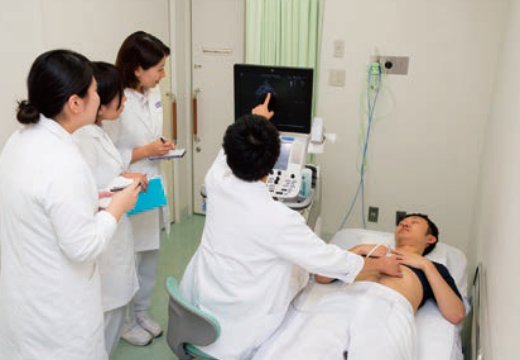 ・Ultrasonography
・Ultrasonography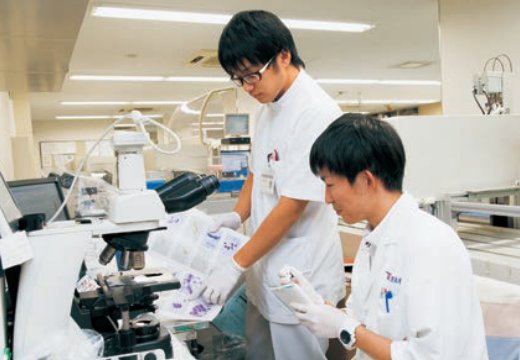 ・Hospital Practice of Clinical Laboratory Science
・Hospital Practice of Clinical Laboratory Science